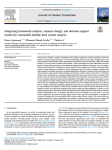Agyemang P., Kwofie E.M., Abunde Neba F. (2022). Integrating framework analysis, scenario design, and decision support system for sustainable healthy food system analysis. Journal of Cleaner Production, 10/20/2022, vol. 372, p. 1-20.
https://doi.org/10.1016/j.jclepro.2022.133661
https://doi.org/10.1016/j.jclepro.2022.133661
| Title: | Integrating framework analysis, scenario design, and decision support system for sustainable healthy food system analysis (2022) |
| Authors: | P. Agyemang ; E.M. Kwofie ; F. Abunde Neba |
| Material Type: | Article |
| In : | Journal of Cleaner Production (vol. 372, October 2022) |
| Article on page: | p. 1-20 |
| Languages: | English |
| Abstract Languages: | English |
| Descriptors: |
Catégories principales 08 - ALIMENTATION ; 8.2 - Nutrition. Alimentation Humaine. SantéThésaurus IAMM AGROFOOD SYSTEM ; SUSTAINABILITY ; DECISION SUPPORT ; SCENARIO |
| Abstract: | In the past two decades, a number of researchers have sought to capture the complex interactions of the food system's outcome through frameworks. In several international discourses and expert foresight studies, food system frameworks are frequently used to argue specific approaches and reforms that seek to reduce the multiple burdens of our food system on humans and the planet. To date, policymakers and other stakeholders have been forced to contend with many threats and uncertainties stemming from different dimensions of our food system. While many frameworks for evaluating food system objectives exist, making context-specific choices that reflect current or future situations accounting for various dimensions of the food system is daunting. Therefore, this study examines food system frameworks considering sustainability dimensions, constructs four-styled future food system scenarios using scenario design technique, and develops a decision support system that (1) determines relevant drivers and framework to evaluate predetermined future food system (2) allows the co-creation of the specific context food system and still identify relevant drivers and frameworks. Thus, providing a more selective use of food system frameworks which provides stakeholders with insights to take necessary pre-emptive actions or interventions and make strategic decisions toward potential shocks and uncertainties in such futures. To achieve this, the Complementary Judgment Matrix method was used to translate the preference of ten participants to weights of importance regarding sustainability dimensions, then propagated onto the Fuzzy-Technique for Order Preference by Similarity to Ideal Solution (TOPSIS) decision model to evaluate frameworks for each dimension. Finally, the results were integrated using scenario design and digital intelligence to develop a novel decision support system. The findings showed that frameworks are skewed toward food and nutrition, with less economic consideration. Also, the scenarios presented provide an invaluable lens to the future of our food system. Furthermore, the proposed decision support system allows food system stakeholders to navigate the constructed scenarios and re-create plausible future scenarios under different contexts. This study provides an exciting opportunity for future policymakers and scholars at different spatio-temporal levels to design and implement policies that will strengthen and render the food system resilient in front of future adversities. |
| Cote : | Réservé lecteur CIHEAM |
| URL / DOI: | https://doi.org/10.1016/j.jclepro.2022.133661 |







